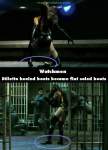
Continuity mistake: During the prison fight scene, Silk Spectre's stiletto boot heels are alternatively flat-soled from shot to shot, for the stunt woman's benefit.

Revealing mistake: During the final confrontation in Veidt's lair, you see the actor Billy Crudup in his SFX suit reflected in Nite Owl's goggles, not the image of Dr. Manhattan.
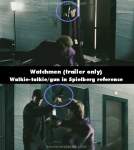
Trivia: This is for the trailer rather than for the final film, but worth a look. At 1:33 in the trailer, just after seeing Rorschach slam someone against a wall, we see another fight. Pause it and look at the guy in black - he's holding a walkie-talkie, which in the next shot becomes a gun. This is only trivia, not a mistake, because it's only valid for the trailer. The MPAA don't allow guns to be pointed at the screen in trailers, so Zack Snyder, in a tribute to the infamous gun-editing from E.T., replaced the gun in that one shot with a walkie-talkie. (00:01:30)
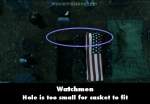
Other mistake: During the Comedian's funeral, in a shot from above showing both grave and the casket, the grave is actually shorter than the casket. (00:33:55)

Revealing mistake: When Veidt and his cat Bubastis is walking over the bodies of the scientists after he poisons them, you only see Veidt's reflection and not Bubastis' in the energy panels on the walls as he walks towards and up the stairs.
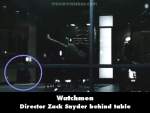
Visible crew/equipment: At the beginning of the movie when the Comedian is fighting with the mysterious masked man in his apartment and the first one is launched towards the table, the director Zack Snyder is hidden behind the kitchen counter and kneeling (this mistake is revealed by Snyder himself in the DVD extras).
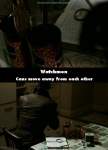
Continuity mistake: When Dan returns home after talking to Mason, he finds Rorschach in his kitchen eating beans from a can. After he has finished eating, he throws the second can on the table where it lands next to another can. When he gets up, the two cans have moved significantly apart. (00:20:15)
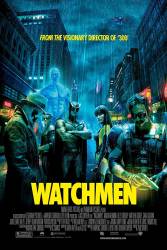





Answer: The short answer is that they weren't really trying to. Ozymandias later revealed, and monopolised on, his costumed identity, Comedian was officially endorsed by the U.S.A. Government at the time so his real identity would have been public record, the first Silk Spectre publicly revealed her identity after retiring, though there is no evidence that the current Silk Spectre has. There is no evidence (even in the graphic novel) that anyone tried to hide their identity to the extent that other comic-book heroes like Batman/Superman do. The only exception being Rorschach where even his follow costumes don't know his real identity until they bust him out of prison.
Sanguis